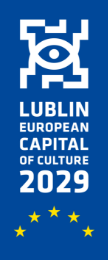Employees of the Centre for Culture in Lublin talked to one of the co-authors of the Lublin ECC 2016 application – Marcin Skrzypek from the “Grodzka Gate – NN Theatre” Center. The interview for the KULTURA ENTER magazine concerned Lublin’s participation in the European Capital of Culture 2029 competition.
Marcin Skrzypek: Do you often find yourselves interviewed on this subject?
Rafał “Koza” Koziński (Director of the Centre for Culture): This is our second interview about ECoC 2029. Previously, we only talked to “Jawny Lublin” after Lublin was shortlisted in the competition.
Why so?
Paweł Passini: In this edition of the ECoC, the situation is different, and we, as a team behind the application, function differently. For example, we can’t approach the experts who evaluate the application. We must avoid even the accidental encounters with them. Advertising, and public relations – this is the city’s task, not ours.
Things have changed a bit since last time.
R.K.: And that’s where we should start. Many Polish cities consciously gave up on the ECoC 2029 competion because they did not want to re-enter the process. Besides, there was a pandemic, a crisis, then a war. People thought it wasn’t a good time to start racing to see who would throw a bigger party. Initially, I also had this approach, but I read that the rules and criteria of this competition had changed. It’s no longer about a “festival of festivals.” New regulations and rules were established. It turned out that now it’s about a process, not a mega event. This is a trial of error. The ECoC aims to solve urban problems while giving it a European tone.
Is that why the abbreviation ECoC 2029 appeared on the promotional banners – from the English name of the European Capital of Culture? An attempt to cut yourself off from the past?
R.K.: No, this abbreviation is used parallel to ECoC 2029 in some advertisements due to tourists and foreign students.
P.P.: Moreover, this is the original name of this competition, which we use in order to recognize its European dimension.
R.K.: We deliberately changed the logo to make it clear that it’s about Europe. Now there are three in one: the city logo, the ECoC and the European Union flag. Because, contrary to appearances, in Lublin we still need to become European.
It was an issue in previous years. Cities received the ECoC title, but then the European Commission and Parliament no longer had influence on how the ECoC events were presented to residents. Guidelines regarding the ECoC require the holders of the EcoC title to indicate it is a European Union project.
The situation from the beginning of the century is repeating. At that time everything had to have the prefix “euro”. I thought we were already Europeanized enough…
P.P: We still live in an alternative reality. For the last eight years, foreign cooperation in our country has been censored. For example, in ministerial proposals, the international cooperation factor is still underestimated. Our region is a black spot in this respect. We already have good contacts in the North and the South, but only a few partners in the West. The countries of the old EU have different cultural policies and are rated well in terms of international cooperation. They prepare ECoC applications using the same “engines” that they have been using to submit applications to their ministries for years.
Miłosz Zieliński: The countries of the new EU have always had a problem with this aspect. That’s why for at least five editions of the ECoC they have been told to Europeanize and network.
The networking seems to be missing in Lublin, according to some critics.
R.K.: We feel that when creating an image of the city for the application, for it to be truly coherent and representative, we must communicate with a specific group of people, and not talk to everyone through the media. We invited all residents to submit ideas and share their dreams. There have been over 3,000 submissions. The cultural community had two calls for proposals and 500 projects were submitted.
The interview was published in the 110th issue of Kultura Enter 2024/03. The full conversation is available here.
